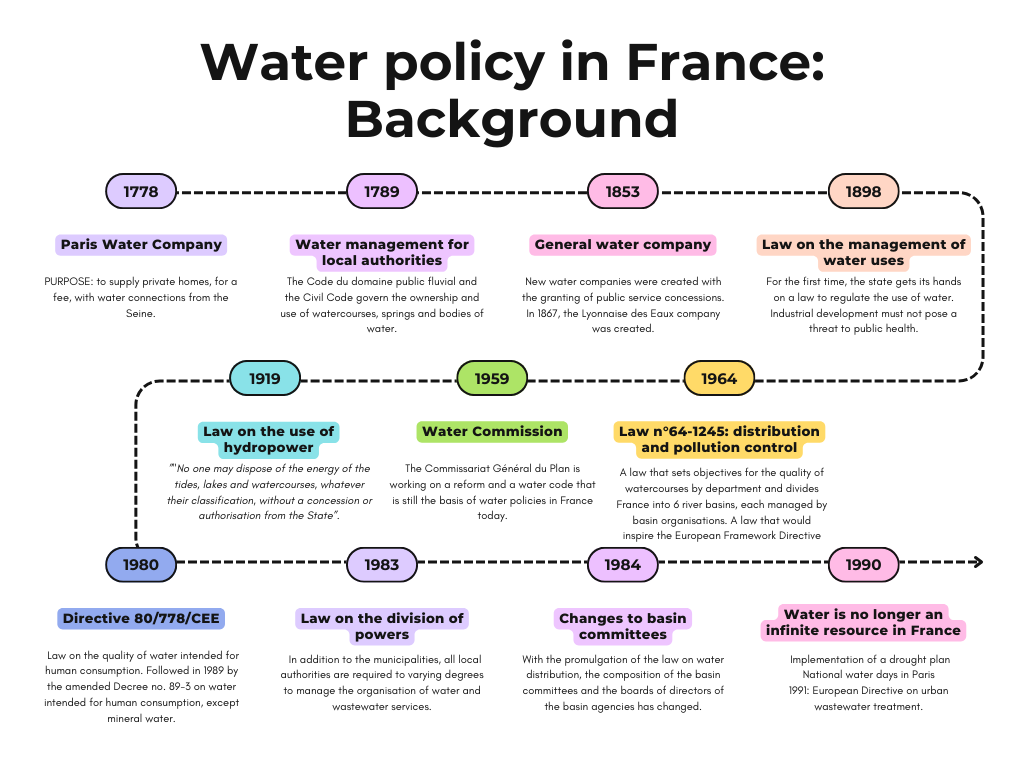“Experts estimate that climate change could lead to a 10-40% drop in river flows and groundwater levels by the end of the century, as well as an increase in drought episodes”, states the information website vie-publique.fr. The findings are clear-cut, and have led to strict regulations on water management in France.
Long considered abundant, water is now perceived as a limited resource whose quality is under threat. Water management is therefore becoming a major economic, environmental, and social issue that is guiding national and local policies.
To ensure access to water for future generations but also to protect human health, responsible water management involves farmers and industrialists as well as local authorities and citizens to be subject to regulations (through mandatory sustainability reporting, for example).
Here’s an overview.
A brief history of water regulations in France

It was the law of 1964 that laid the foundations for decentralised management (watershed-based management) and concerted action (elected representatives, local authorities, and users) of water policy. It gave birth to the water agencies, which were responsible for implementing the “polluter pays” principle.
The 1992 law, known as the “Water Law”, formalised the desire to pursue a public policy of responsible management. Water became the “common heritage of the nation” and therefore a resource of general interest. This text reinforces the protection of aquatic environments and the quantity and quality of water (obligation to collect and treat wastewater, for example). It also provides for overall planning (identification of objectives and priorities) with the preparation of a water development and management master plan (SDAGE) and a water development and management scheme (SAGE), the local version of the SDAGE.
The European Water Directive, a legal framework for sustainable water management
Inspired by the French law of 1964, the Water Framework Directive (WFD) was adopted on 23 October 2000 by the European Parliament and the Council. It introduces an obligation to achieve results in protecting and restoring the quality of water and aquatic environments throughout the European Union. It also strengthens the decentralisation of water management.
The 2004 law, which transpose it into French law, establishes an initial list of 33 substances (metals, pesticides, hydrocarbons), supplemented by Directive D 2008/105/EC, which sets environmental quality standards applicable to eight other products.
Since then, legislation has continued to evolve to ensure that France meets the WFD objectives for the good ecological and chemical status of aquatic environments. This is particularly true of the 2006 Law, also known as the “LEMA” (Law on water and aquatic environments), which overhauled water policy and is now its central text. Among other things, it creates a “water police”.
What are the latest regulatory developments?
The decree of 23 June 2021 on the quantitative management of water resources and the management of drought-related crises harmonises water abstraction restrictions at national level. It should be noted that this decree authorises higher levels of abstraction for farmers in critical situations.
It is supplemented by the decree of 29 July 2022, which extends the conditions for water abstraction to periods of low water. The basin coordinating prefect may thus carry out “assessments of the volumes that may be available for human uses outside low-water periods, with regard to the hydrological regime and in compliance with the proper functioning of aquatic environments, natural balances and the objectives of the master plan for water development and management“.
A collective action plan for resilient and concerted water management was also presented in March 2023. It proposes 53 measures based on 6 major issues:
- Organising sober use of water for all stakeholders.
- Optimising the availability of water resources.
- Preserving water quality and restoring healthy, functional ecosystems.
- Put in place the means to achieve this.
- Respond better to drought crises.
- Meet our commitments.
How are farmers, industrialists, local authorities and citizens involved?
To guarantee the preservation of water and aquatic environments, the water police, made up of a judicial body (gendarmes, police officers, fisheries wardens, etc.) and an administrative body (Direction Départementale des Territoires or DDT, Office Français de la Biodiversité or OFB, in particular), are responsible for carrying out checks and applying penalties and formal notices in the event of non-compliance.
Installations, structures, works or activities (IOTA) are therefore monitored by the water police, who may intervene at any stage in their progress (works phase, operating phase, exceptional conditions). Compliance with local sanitation regulations is also monitored by the SPANC or the mayor.
For farmers, industrialists, local authorities and the citizens, any project that may have an impact, direct or indirect, positive or negative, on aquatic environments is subject to declaration or authorisation.
Responsible water management is everyone’s business
In order to prevent and reduce water pollution, promote sustainable water use, protect and restore aquatic environments and mitigate the effects of floods and droughts, water management is subject to a regulatory framework that is becoming stricter over time.
For all users – farmers, industrialists, local authorities and citizens – this implies responsible use of this resource, which is all the more precious for its increasing scarcity.